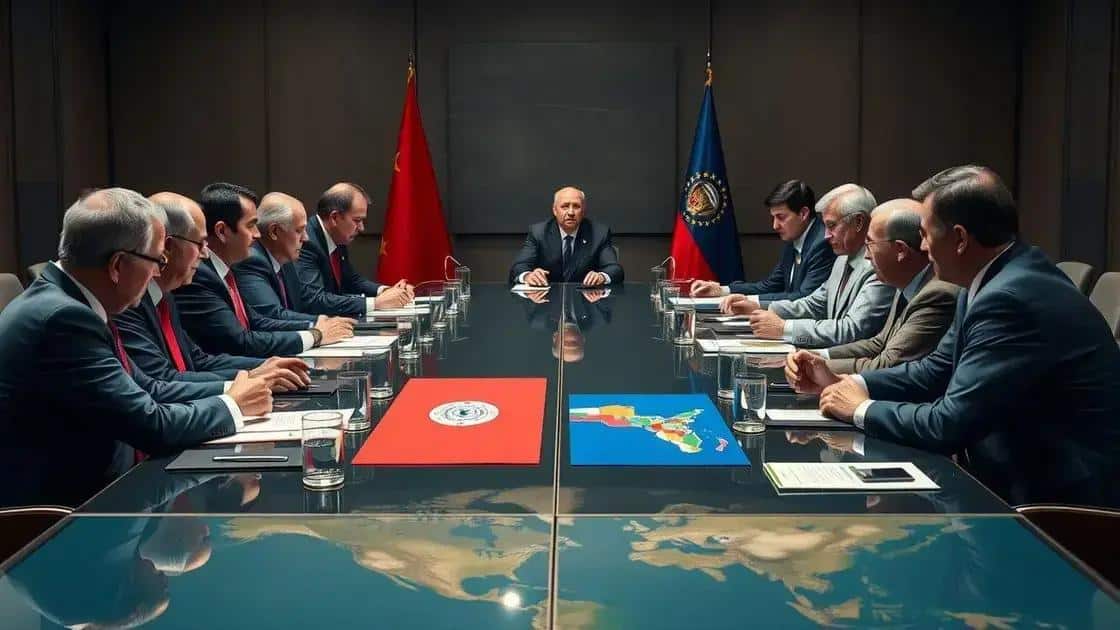International trade agreements and their hidden impacts

Anúncios
International trade agreements are contracts between countries that define trade rules, aiming to boost economic growth while presenting challenges like job displacement and environmental concerns.
International trade agreements play a crucial role in shaping global commerce, but do you really know how they impact your daily life? Let’s dive into their significance and explore what they mean for economies worldwide.
Anúncios
Understanding international trade agreements
Understanding international trade agreements is key to grasping how countries interact with one another economically. These agreements can shape everything from prices to job opportunities. Now, let’s delve deeper into their significance and structure.
What Are International Trade Agreements?
At their core, international trade agreements are contracts between countries that outline the rules for exchanging goods and services. They aim to facilitate trade by reducing barriers, such as tariffs and quotas. By doing so, these agreements can lead to increased competition and lower prices for consumers.
Anúncios
There are various types of trade agreements, including:
- Bilateral agreements between two countries.
- Multilateral agreements involving multiple countries.
- Regional trade agreements, like NAFTA or the EU.
Key Benefits of Trade Agreements
Countries engage in international trade agreements for a number of reasons. They often lead to economic growth and stronger diplomatic relations. By opening markets, countries can:
- Increase exports and imports.
- Boost domestic employment opportunities.
- Encourage foreign investment.
Another essential aspect of these agreements is their role in setting standards. Trade agreements often include regulations that protect the environment and labor rights, promoting ethical practices globally. It’s also important to note that these agreements can sometimes bring about challenges, as different countries have varying economic levels and interests.
As countries negotiate these agreements, the balance they strike can significantly affect their economies and citizens. Ongoing discussions about adjustments reflect the dynamic nature of international trade agreements.
Key players in trade negotiations

Understanding who the key players are in trade negotiations helps clarify how international agreements are crafted. Different stakeholders bring their unique interests and perspectives to the table. This collective effort shapes the outcome of trade agreements and their effectiveness.
Government Officials
One of the main groups involved in trade negotiations is government officials. They represent their countries and work to protect national interests. These officials often come from various departments, such as trade, finance, and agriculture. Their goal is to secure favorable terms that will help their economy.
Industry Representatives
Another important player in these negotiations is industry representatives. These individuals advocate for specific sectors, making sure that their concerns and needs are voiced. By doing so, they can influence the terms of agreements to benefit their industries. Key areas often included are:
- Agriculture and food products.
- Technology and intellectual property.
- Services and investment.
Non-Governmental Organizations (NGOs)
Non-governmental organizations also play a role in trade negotiations. They often focus on issues like human rights, environmental protection, and labor standards. NGOs push governments to consider social and environmental impacts during negotiations. This advocacy can lead to more balanced agreements that benefit a wider audience.
Additionally, there are often public opinions and media influences that can sway negotiations. Citizen input shows the importance of transparency and accountability, encouraging a comprehensive view of trade policies. Hence, the dynamics of trade negotiations are complex, involving multiple players who aim to forge agreements that can either uplift or challenge the global economy.
The economic impact of trade agreements
The economic impact of trade agreements is profound, influencing jobs, prices, and economic growth. Understanding these effects can help us appreciate the significance of such agreements in our daily lives.
Job Creation and Loss
One major consequence of trade agreements is their effect on jobs. They can create new jobs in export-focused sectors and improve job security in the long term. However, there can also be job losses in industries that cannot compete with foreign imports. This dual impact is essential to recognize.
- Export-related jobs tend to grow.
- Some domestic industries may shrink or close.
- Workers may need retraining for new positions.
Consumer Prices
Trade agreements also influence consumer prices. When tariffs are reduced, imported goods become cheaper. Consequently, this gives consumers a wider variety of choices at lower prices. A broader selection can lead to higher living standards for many.
Economic Growth
Moreover, trade agreements can boost economic growth. By opening markets, countries can increase trade volumes. This increase often leads to higher gross domestic product (GDP) and overall economic health. More trade means more opportunities for businesses to grow and innovate.
However, it’s crucial to be aware of potential downsides. Economic growth from trade agreements may not be evenly distributed. Some communities or industries may see fewer benefits than others. Moreover, local production could decline as imports fill the market. This dynamic results in a complex landscape where the advantages and disadvantages must be examined closely.
Challenges and controversies surrounding trade deals

Challenges and controversies surrounding trade deals often arise from differing interests among nations and the impact on local economies. Many people have mixed feelings about how these agreements affect their lives, which leads to heated debates. Understanding these challenges can provide clarity on the complex nature of international trade agreements.
Economic Disparities
One significant concern is the economic disparity that trade agreements can create. While some sectors may thrive, others might struggle to compete. This can lead to job losses in vulnerable industries. Workers in these sectors often express their dissatisfaction, as their voices may not be prioritized in negotiations.
- Export-oriented jobs may increase.
- Import-sensitive industries may decline.
- Regional economies may face uneven growth.
Environmental Concerns
Another pressing issue is related to environmental standards. Critics argue that trade deals may prioritize economic growth over environmental protection. This concern leads to fears that companies might relocate to countries with lax regulations. Hence, the actual benefits of increased trade may come at a cost to the planet.
Societal Impact
Societal issues also emerge, particularly regarding labor rights and conditions. Many activists believe that trade agreements can undermine labor protections. In the race to attract foreign investment, some governments may weaken labor laws. This tension can provoke public outcry, highlighting the importance of balancing economic growth with social responsibility.
Furthermore, public trust in trade policies can wane when communities feel overlooked. The pressure to create fair agreements that consider local interests is vital in addressing these controversies. By fostering inclusive negotiations, stakeholders can aim for solutions that work for everyone involved.
FAQ – Frequently Asked Questions about International Trade Agreements
What are international trade agreements?
International trade agreements are contracts between countries that outline the rules for trading goods and services. They aim to reduce barriers and facilitate trade.
How do trade agreements impact jobs?
Trade agreements can create new jobs in export sectors but may also lead to job losses in industries that cannot compete with foreign goods.
What are the environmental concerns associated with trade agreements?
Critics worry that trade agreements may prioritize economic growth over environmental protection, potentially leading to increased pollution and resource depletion.
Why is public opinion important in trade negotiations?
Public opinion can shape negotiations by ensuring that community concerns are addressed, promoting transparency and fairness in trade policies.






